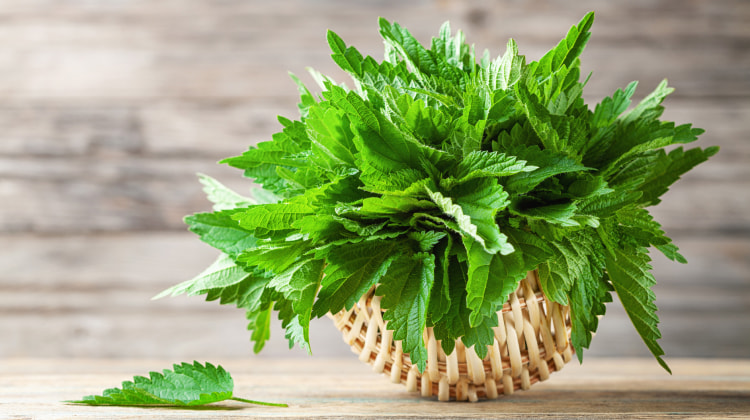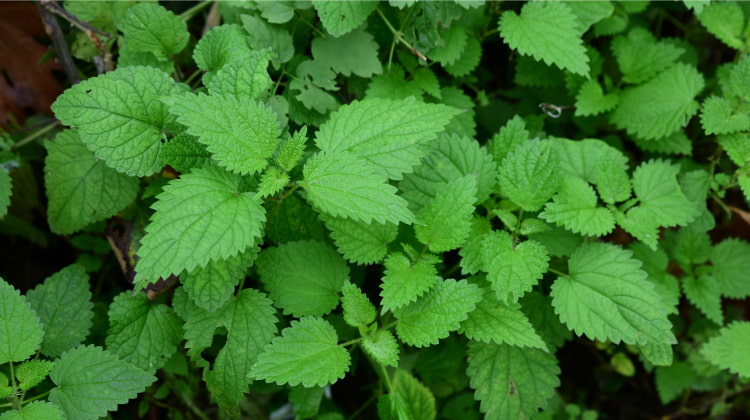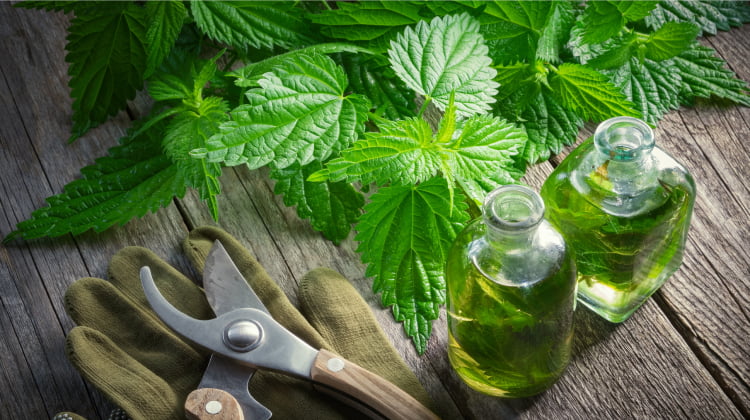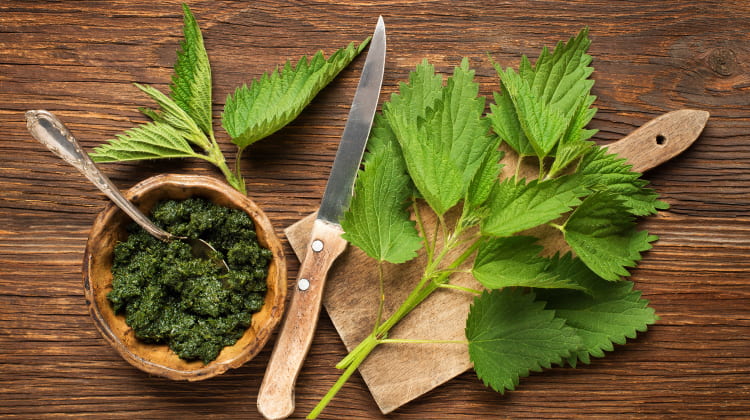
Ever heard of stinging nettle and wondered what it could do for your hair? Well, let me tell you, it's a hidden gem that can work wonders! Stinging nettle, scientifically known as Urtica dioica, is a perennial plant that is often found in gardens and wild spaces. It might have a prickly reputation, but don't let that fool you. When it comes to hair care, this unassuming green plant is loaded with essential nutrients as well as minerals.
So, if you're curious to learn more about the benefits of stinging nettle for hair, how to use it for hair growth, and even the potential side effects, keep reading! In this article, we'll dive into everything you need to know about this amazing natural remedy and uncover the secrets behind its hair-enhancing powers.
6 Amazing Benefits of Stinging Nettle for Hair
As promised, let's dive into the amazing benefits of stinging nettle for hair. This wonder plant has been used for centuries as a natural remedy for various ailments, and when it comes to hair care, it truly shines. Here are some of the key benefits of stinging nettle for your hair:
Promote Hair Growth
One of the most impressive benefits of stinging nettle is its ability to promote hair growth(1). Rich in vitamins A and C, this plant plays a crucial role in the production of sebum, the natural oil that keeps your hair and scalp moisturized and healthy.
Vitamin A, in particular, is essential for cell growth, including hair cells. By supporting the production of sebum, stinging nettle ensures that your hair remains hydrated and less prone to breakage.
Additionally, the high iron content of stinging nettle supports healthy blood circulation in the scalp. Proper blood flow is crucial for hair growth, as it delivers oxygen and essential nutrients to the hair follicles, stimulating growth and overall hair health.
Reduce Hair Loss
Stinging nettle is well-known for its ability to combat hair loss, a problem that affects countless individuals around the world. The secret behind its hair loss prevention properties lies in the plant's compounds that inhibit the production of DHT (dihydrotestosterone), a hormone responsible for hair loss in both men and women.
When DHT levels in the scalp are high, hair follicles can shrink, resulting in weaker hair and, eventually, hair loss. By reducing DHT levels, stinging nettle helps to prevent hair loss, promoting the growth of stronger, healthier hair in the process.

Nourish the Scalp
A healthy scalp is essential for healthy hair, and stinging nettle is a perfect ally in this regard. An irritated, inflamed scalp can lead to various hair issues, such as dandruff, itchiness, and even hair loss. Stinging nettle's anti-inflammatory properties can help soothe and calm irritated scalps, providing relief from discomfort and redness.
Moreover, its high mineral content, which includes potassium, magnesium, and calcium, nourishes the scalp and hair follicles. These essential minerals contribute to a well-balanced and healthy scalp environment, paving the way for optimal hair growth and overall hair health.
Strengthen Hair
Stinging nettle's rich mineral content(2) is a boon for your hair, as it helps to strengthen and fortify each strand. Minerals like calcium, magnesium, and silica found in stinging nettle play a crucial role in improving hair structure and resilience.
Calcium, for instance, is essential for maintaining hair elasticity and preventing breakage. Magnesium helps to prevent hair thinning and loss, while silica contributes to stronger hair by improving the hair's structural integrity. By providing these essential nutrients, stinging nettle ensures your hair is less prone to breakage and damage, leaving you with stronger, healthier locks.
Enhance Hair Color
Stinging nettle can also help enhance your hair's natural color, giving it a beautiful, vibrant shine. The plant is believed to possess astringent properties that can help to darken and enrich the hair's natural hue. This effect is particularly beneficial for those with darker hair, as it can add depth and richness to the color.
Stinging nettle's high vitamin and mineral content also helps to improve overall hair health, which in turn contributes to more radiant and lustrous hair. So, if you're looking to give your hair a natural boost in color and shine, stinging nettle might be just the remedy you need.
Combat Dandruff
Dandruff is a common and frustrating scalp issue that many people experience. Stinging nettle is here to save the day with its anti-inflammatory and antimicrobial properties(3). The plant's anti-inflammatory properties help to alleviate scalp irritation and redness often associated with dandruff, providing much-needed relief.
Its antimicrobial properties, on the other hand, help to fight off the yeast and bacteria that can contribute to dandruff formation. By addressing both the symptoms and the underlying causes of dandruff, stinging nettle can help to keep your scalp feeling fresh, clean, and flake-free.
How to Use Stinging Nettle for Hair Growth
Now that you're familiar with the incredible benefits of stinging nettle for hair, let's explore how to use this amazing plant for hair growth. There are various ways to incorporate stinging nettle into your hair care routine, and here are some of the most popular and effective methods:
Nettle Tea
Drinking nettle tea is a fantastic way to reap the benefits of stinging nettle for hair growth. Packed with essential vitamins and minerals, nettle tea provides your body with the nutrients needed to support healthy hair growth. To make nettle tea, follow these simple steps:
- Boil water and add 1-2 tablespoons of dried nettle leaves to a teapot or container.
- Pour boiling water over the leaves and steep for 10 minutes.
- Strain the tea into a cup, discarding the leaves.
- Drink the nettle tea regularly for optimal hair growth benefits.
Nettle Hair Rinse
Another popular method is to use stinging nettle as a hair rinse. A nettle hair rinse can help to nourish and strengthen your hair while promoting hair growth. To make a nettle hair rinse, follow these steps:
- Boil 4 cups of water and add a handful of fresh or dried nettle leaves.
- Simmer the leaves for 20 minutes, then strain the liquid and let it cool.
- After shampooing, pour the cooled nettle rinse over your head.
- Massage the rinse into your scalp and work it through your hair.
- Leave the rinse on for a few minutes, then rinse it off with cool water.
Nettle-Infused Oil

Creating a nourishing nettle-infused oil can be an excellent way to harness the benefits of stinging nettle for hair growth. This oil can be used for scalp massages, deep conditioning treatments, or simply as a leave-in treatment to strengthen and protect your hair. To make this oil, follow these steps:
- Fill a jar with dried nettle leaves.
- Cover the leaves with carrier oil, such as olive, coconut, or jojoba oil.
- Seal the jar and place it in a sunny spot for 4 weeks, shaking it gently every few days.
- Strain the oil through a cheesecloth or fine mesh strainer, and store it in a clean container.
Nettle Supplements
Stinging nettle supplements offer a convenient and concentrated way to enjoy the benefits of stinging nettle for hair growth. These supplements are available in various forms, such as capsules, tablets, or tinctures. To use stinging nettle supplements for hair growth, follow these guidelines:
- Choose a reputable brand and the supplement form that best suits your needs.
- Follow the recommended dosage on the label and consult a healthcare professional if needed.
- Incorporate stinging nettle supplements into your daily routine and monitor your hair growth progress.
Nettle and Rosemary Hair Treatment
Combining stinging nettle with rosemary can create a potent hair growth treatment that nourishes your hair and stimulates the scalp. Rosemary(4) is known for its ability to improve blood circulation and promote hair growth, making it an ideal companion for stinging nettle. To make this treatment, follow these steps:
- Prepare nettle-infused oil and rosemary-infused oil separately using the method described in step 3.
- Combine equal parts of both infused oils in a small container.
- Apply the mixture to your scalp and hair, ensuring even coverage.
- Leave the treatment on for at least 30 minutes or overnight for deeper conditioning.
- Wash your hair thoroughly with a gentle shampoo and follow with your regular conditioner.
Potential Side Effects

While stinging nettle is generally considered safe and beneficial for hair growth, it's essential to be aware of potential side effects. As with any natural remedy, individual experiences may vary, and it's crucial to listen to your body and exercise caution. Here are some potential side effects to watch out for when using stinging nettle for hair growth:
Allergic Reactions
Some people may experience allergic reactions to stinging nettle, such as itching, redness, or rashes on the skin. If you notice any signs of an allergic reaction, discontinue use immediately and consult a healthcare professional.
Skin Irritation
Stinging nettle gets its name from the tiny hairs on its leaves that can cause a stinging sensation and skin irritation when touched. To avoid skin irritation, handle fresh nettle leaves with gloves or use dried nettle leaves instead.
Digestive Issues
Consuming stinging nettle in large amounts or over a prolonged period may cause digestive issues in some individuals. To minimize the risk of digestive problems, start with a small amount of nettle tea or supplements and gradually increase the dosage as needed.
Interactions with Medications
Stinging nettle may interact with certain medications, including blood thinners, diuretics, and medications for high blood pressure. If you're taking any of these medications, consult your healthcare professional before using stinging nettle for hair growth.
Pregnancy and Breastfeeding
Although there's limited research on the safety of stinging nettle during pregnancy and breastfeeding, it's best to err on the side of caution. Consult your healthcare professional before using stinging nettle if you're pregnant or nursing.
Final Thought
On the whole, stinging nettle is a remarkable natural remedy with numerous benefits for hair growth, strength, and overall health. From drinking nettle tea and using nettle hair rinses to incorporating nettle-infused oils, supplements, or nettle and rosemary hair treatments, there are plenty of ways to make the most of this powerful plant.
However, it's important to be aware of potential side effects and consult a healthcare professional if needed. By incorporating stinging nettle into your hair care routine, you can enjoy its incredible benefits and say hello to healthier, stronger, and more beautiful hair!
Frequently Asked Questions
Is stinging nettle a DHT blocker?
Yes, stinging nettle is a DHT blocker. It contains compounds that inhibit the enzyme 5-alpha reductase, which converts testosterone to DHT. By blocking DHT, stinging nettle may help reduce hair loss.
Does stinging nettle help hair growth?
Yes, stinging nettle helps hair growth. It's rich in vitamins and minerals that nourish hair follicles, promotes blood circulation, and encourage healthier hair growth.
Does stinging nettle root stop hair loss?
Stinging nettle roots can potentially stop hair loss. As a DHT blocker, it helps reduce hair loss associated with DHT sensitivity, promoting healthier hair.
How much stinging nettle for hair loss?
The optimal amount of stinging nettle for hair loss varies. Start with small doses of nettle tea, supplements, or topicals, and adjust as needed based on individual results and tolerance.
References
1. Moradi (2015). The histological and histometrical effects of Urtica dioica extract on rat’s prostate hyperplasia. Veterinary research forum : an international quarterly journal, {online} 6(1). Available at: https://pubmed.ncbi.nlm.nih.gov/25992248/.
2. Repajić, Maja, et al. “Bioactive Compounds in Wild Nettle (Urtica Dioica L.) Leaves and Stalks: Polyphenols and Pigments upon Seasonal and Habitat Variations.” Foods, vol. 10, no. 1, 18 Jan. 2021, p. 190, https://doi.org/10.3390/foods10010190.
3. Kregiel, Dorota, et al. “Urtica Spp.: Ordinary Plants with Extraordinary Properties.” Molecules, vol. 23, no. 7, 9 July 2018, p. 1664, https://doi.org/10.3390/molecules23071664.
4. Murata, Kazuya, et al. “Promotion of Hair Growth ByRosmarinus OfficinalisLeaf Extract.” Phytotherapy Research, vol. 27, no. 2, 20 Apr. 2012, pp. 212–217, https://doi.org/10.1002/ptr.4712.

.jpg)
.jpg)
.jpg)
.jpg)
.jpg)
.jpg)
.jpg)
.jpg)
.jpg)
.jpg)